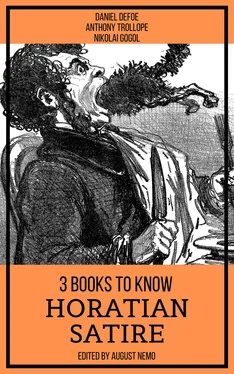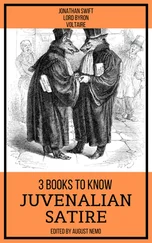May life be to them a succession of hurts;
May fleas by the bushel inhabit their shirts;
May aches and diseases encamp in their bones,
Their lungs full of tubercles, bladders of stones;
May microbes, bacilli, their tissues infest,
And tapeworms securely their bowels digest;
May corn-cobs be snared without hope in their hair,
And frequent impalement their pleasure impair.
Disturbed be their dreams by the awful discourse
Of audible sofas sepulchrally hoarse,
By chairs acrobatic and wavering floors—
The mattress that kicks and the pillow that snores!
Sons of cupidity, cradled in sin!
Your criminal ranks may the death angel thin,
Avenging the friend whom I couldn't work in.
K.Q.
COMPROMISE, n. Such an adjustment of conflicting interests as gives each adversary the satisfaction of thinking he has got what he ought not to have, and is deprived of nothing except what was justly his due.
COMPULSION, n. The eloquence of power.
CONDOLE, v.i. To show that bereavement is a smaller evil than sympathy.
CONFIDANT, CONFIDANTE, n. One entrusted by A with the secrets of B, confided by him to C.
CONGRATULATION, n. The civility of envy.
CONGRESS, n. A body of men who meet to repeal laws.
CONNOISSEUR, n. A specialist who knows everything about something and nothing about anything else.
An old wine-bibber having been smashed in a railway collision, some wine was pouted on his lips to revive him. "Pauillac, 1873," he murmured and died.
CONSERVATIVE, n. A statesman who is enamored of existing evils, as distinguished from the Liberal, who wishes to replace them with others.
CONSOLATION, n. The knowledge that a better man is more unfortunate than yourself.
CONSUL, n. In American politics, a person who having failed to secure an office from the people is given one by the Administration on condition that he leave the country.
CONSULT, v.i. To seek another's disapproval of a course already decided on.
CONTEMPT, n. The feeling of a prudent man for an enemy who is too formidable safely to be opposed.
CONTROVERSY, n. A battle in which spittle or ink replaces the injurious cannon-ball and the inconsiderate bayonet.
In controversy with the facile tongue—
That bloodless warfare of the old and young—
So seek your adversary to engage
That on himself he shall exhaust his rage,
And, like a snake that's fastened to the ground,
With his own fangs inflict the fatal wound.
You ask me how this miracle is done?
Adopt his own opinions, one by one,
And taunt him to refute them; in his wrath
He'll sweep them pitilessly from his path.
Advance then gently all you wish to prove,
Each proposition prefaced with, "As you've
So well remarked," or, "As you wisely say,
And I cannot dispute," or, "By the way,
This view of it which, better far expressed,
Runs through your argument." Then leave the rest
To him, secure that he'll perform his trust
And prove your views intelligent and just.
Conmore Apel Brune
CONVENT, n. A place of retirement for woman who wish for leisure to meditate upon the vice of idleness.
CONVERSATION, n. A fair for the display of the minor mental commodities, each exhibitor being too intent upon the arrangement of his own wares to observe those of his neighbor.
CORONATION, n. The ceremony of investing a sovereign with the outward and visible signs of his divine right to be blown skyhigh with a dynamite bomb.
CORPORAL, n. A man who occupies the lowest rung of the military ladder.
Fiercely the battle raged and, sad to tell,
Our corporal heroically fell!
Fame from her height looked down upon the brawl
And said: "He hadn't very far to fall."
Giacomo Smith
CORPORATION, n. An ingenious device for obtaining individual profit without individual responsibility.
CORSAIR, n. A politician of the seas.
COURT FOOL, n. The plaintiff.
COWARD, n. One who in a perilous emergency thinks with his legs.
CRAYFISH, n. A small crustacean very much resembling the lobster, but less indigestible.
In this small fish I take it that human wisdom is admirably
figured and symbolized; for whereas the crayfish doth move only
backward, and can have only retrospection, seeing naught but the
perils already passed, so the wisdom of man doth not enable him to
avoid the follies that beset his course, but only to apprehend
their nature afterward.
Sir James Merivale
CREDITOR, n. One of a tribe of savages dwelling beyond the Financial Straits and dreaded for their desolating incursions.
CREMONA, n. A high-priced violin made in Connecticut.
CRITIC, n. A person who boasts himself hard to please because nobody tries to please him.
There is a land of pure delight,
Beyond the Jordan's flood,
Where saints, apparelled all in white,
Fling back the critic's mud.
And as he legs it through the skies,
His pelt a sable hue,
He sorrows sore to recognize
The missiles that he threw.
Orrin Goof
CROSS, n. An ancient religious symbol erroneously supposed to owe its significance to the most solemn event in the history of Christianity, but really antedating it by thousands of years. By many it has been believed to be identical with the crux ansata of the ancient phallic worship, but it has been traced even beyond all that we know of that, to the rites of primitive peoples. We have to-day the White Cross as a symbol of chastity, and the Red Cross as a badge of benevolent neutrality in war. Having in mind the former, the reverend Father Gassalasca Jape smites the lyre to the effect following:
"Be good, be good!" the sisterhood
Cry out in holy chorus,
And, to dissuade from sin, parade
Their various charms before us.
But why, O why, has ne'er an eye
Seen her of winsome manner
And youthful grace and pretty face
Flaunting the White Cross banner?
Now where's the need of speech and screed
To better our behaving?
A simpler plan for saving man
(But, first, is he worth saving?)
Is, dears, when he declines to flee
From bad thoughts that beset him,
Ignores the Law as 't were a straw,
And wants to sin—don't let him.
CUI BONO? [Latin] What good would that do me?
CUNNING, n. The faculty that distinguishes a weak animal or person from a strong one. It brings its possessor much mental satisfaction and great material adversity. An Italian proverb says: "The furrier gets the skins of more foxes than asses."
CUPID, n. The so-called god of love. This bastard creation of a barbarous fancy was no doubt inflicted upon mythology for the sins of its deities. Of all unbeautiful and inappropriate conceptions this is the most reasonless and offensive. The notion of symbolizing sexual love by a semisexless babe, and comparing the pains of passion to the wounds of an arrow—of introducing this pudgy homunculus into art grossly to materialize the subtle spirit and suggestion of the work— this is eminently worthy of the age that, giving it birth, laid it on the doorstep of prosperity.
CURIOSITY, n. An objectionable quality of the female mind. The desire to know whether or not a woman is cursed with curiosity is one of the most active and insatiable passions of the masculine soul.
CURSE, v.t. Energetically to belabor with a verbal slap-stick. This is an operation which in literature, particularly in the drama, is commonly fatal to the victim. Nevertheless, the liability to a cursing is a risk that cuts but a small figure in fixing the rates of life insurance.
CYNIC, n. A blackguard whose faulty vision sees things as they are, not as they ought to be. Hence the custom among the Scythians of plucking out a cynic's eyes to improve his vision.
Читать дальше












